Moira Millán, author, activist and traditional Mapuche weychafe (warrior, guardian) has been living the quarantine in the isolation of her remote lof (community) in the Patagonian mountains, a community slowly being built on stolen land that she and her people have reclaimed. To send this piece she had to face roadblocks, hide from spying neighbors, avoid police and wait in the street on a cold and rainy morning for a strong enough internet connection to send it. Your reading it makes the sacrifice worthwhile.
My people, my friends, ask how I am, and I don’t respond. My long silences disquiet and concern them. However, this silence is full of words: I came out to walk around my lof, to look at the mountain, to breathe its autumn scents and to talk to all of you as well, to think about you, practicing telepathic ways to communicate.
Some respond saying they have dreamed of me, others that my image has suddenly arisen in their memory, so I’m getting to know who turns off the TV and social media in order to truly connect to the world.
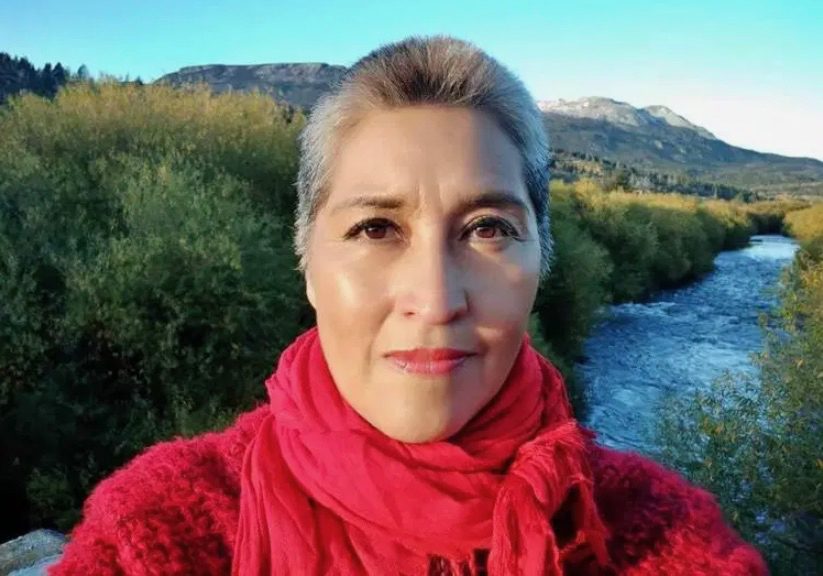
Today I will tell you how I am living the quarantine. I am fortunate to have left the city some time ago. Twenty years back I was certain that a territory was calling me, far from the city, and I heeded its calling without a doubt. Today I know that the huge prison with invisible bars called metropolis is no longer subtly fenced. The earth-killers of the world have discovered over time efficient methods to exert control. They know how to inoculate terror, how to invest millions of dollars in chemical, viral, bacteriological weapons. They succeed at making us believe that they, the ones who make us sick, will heal us. They who kill us will take care of us. They who take our freedom away call us to resign ourselves in order to resist a new enemy.
This time it is not a terrorist group, it’s a virus. They can’t keep on inventing wars because warmongering is outdated; now the threat is not human but viral, invisible. They don’t mention other lethal dangers affecting peoples’ health. They silence the voices of emaciated bodies crying their hunger, because this system has been built and sustained by the earth-killers to devour us and to get fat with the people it consumes.
The quarantine caught me here in the Mapuche lof (community) Pillan Mahuiza. Life goes on in tune with the cycles marked by nature. We embrace each other, we gather around the fire every night, we share food and words. As the starry sky shines over us, we distribute tasks for intense work days. We are eight women, three men and two girls. Most of us sleep in tents because the quarantine caught us building our houses. The state won’t allow us to buy construction materials – perhaps it believes that the virus can be transmitted from lumber to lumber, from plate to plate. But it does allow us instead to buy alcoholic beverages without restriction, with no limitations.
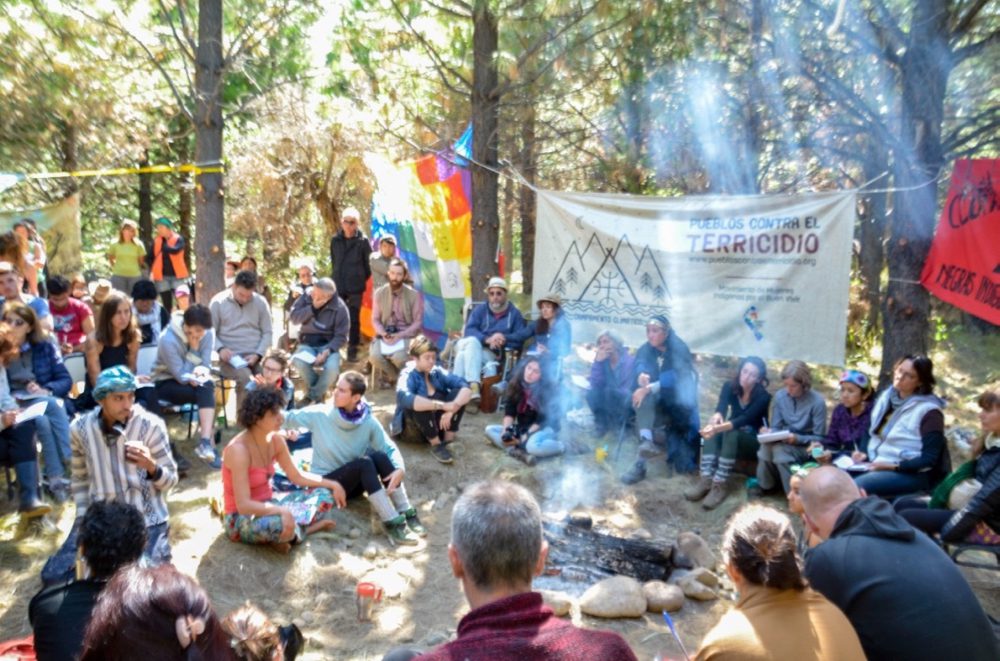
This has been a decisive factor in the increase of gender violence in many indigenous communities. Fortunately, alcoholism does not exist in our lof.
Fall has arrived, with its magical colours painting the landscape in red, orange and yellow strokes. With it also came mawun — the rain, cold and abundant. Then our first frustrations began: tents, mattresses and blankets get wet, it floods everywhere and it takes time to get the water out… it makes us tired and angry. Why do we have to endure something that might have been avoided? Because Buenos Aires centralism kills!
Didn’t it occur to any state official to differentiate risk zones into high risk, low risk and no risk zones? In spite of the fact that there are micro zones of absolute no risk to covid19, the application of universal measures doesn’t take this into account and makes them absurd, aggressive and fearsome.
Frost has arrived as well, bringing with it a shiny icy coating that sticks to the tents. Then the risk of falling ill gets stronger: not to covid19 but to pneumonia and other illnesses related to this climate. The state appears to repress, boycott and deny our lives. As a Mapuche I don’t know any other nation/state acting differently, so I wonder: how are my Zapatista sisters going through this quarantine? And the proud self-governed people of Cheran?
With self-management and creativity we face the struggle against the cold by building clay stoves, protecting our collective spaces with strong walls made from recycled garbage and covered with clay. We reinvent warm clothes and blankets. We organize our food by rationing those products which will become scarce. The day is spent carrying water, chopping wood, cleaning the composting toilets, collecting mushrooms and seasonal fruits, making jams, baking bread. We also make room for laughter, dialogue, affection, games, ceremonies like the sunrise wixalxipal.
These days I’ve gone through a very special ceremony to mark my plenipause: reproductive fertility has ended in my body so I wish to thank the mapu (earth), pu ngen (spiritual caretakers), pu newen (spiritual forces) and kuifikecheyem (ancestors) for my multiple motherhood – not only for the children she has given me, but for my granddaughter as well, and the children of the children to come forth.
During that ceremony I asked the leufu (river) for wisdom to be able to carry on my grandmotherhood as a contribution to a different and better humanity. I shaved my head and offered my long braid to the earth. This was not only an act of gratitude and request; I also claimed and re-signified a small part of my life history, during my first moments of life.
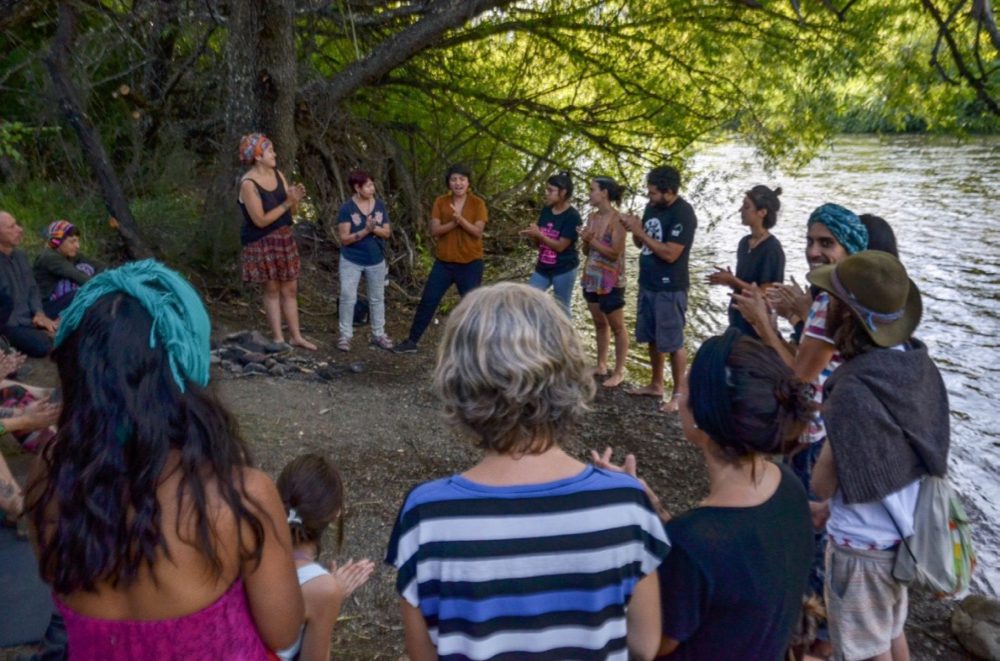
A few weeks after my birth my head was shaved, and one of my father’s nieces exclaimed: “she looks like Peyenka!” This comment brought up laughter, and since then I was called Peyenka all my childhood. But who was Peyenka?
I learned about it by stitching together shredded scraps of my mother’s memory, as well as from some elder friends of hers. Peyenka was a Tehuelche woman, tall and very dark, her face wide and strong, who had been gang-raped by Argentinian soldiers at the beginning of her adolescence. After that episode she shaved her head. She was terrified of men and also despised them. She spoke only to women, she dressed in rags from previous Mapuche outfits, and lived under a wild grass shack. As she refused to integrate, the invading state could never assimilate her and for this reason the “civilized” people considered her crazy and made fun of her.
When I was a child it shamed me that the chosen nickname for me was the name of a mad woman. Today, I carry her footsteps proudly in my history: she was a courageous, strong woman who did not wish to forget, forgive or deny her identity. In some way, my shaved head also reminds me of the chineo (Argentinian “cultural” practice of raping native girls) and the myriad raped women, my own rape at eighteen, which remained silent for a long time due to shame and fear. It reminds me that this state continues to be the same, and that I – just like Peyenka – don’t trust it. It also reminds me of how the women of the world were stripped of their powers. By breaking the sacred bond between women’s wombs and earthly womb, this perverse civilizing matrix convinced us that the sacred bond referred solely to our fidelity to men and attributed it to marriage. With our memories taken away we believed them, although our deep loneliness had nothing to do with finding our better half, but with separation from the land.
I know that my hair will grow, just like our strength must grow from the mapu to overcome the terricide. The mentors of death, the rulers of the world don’t want buen vivir (good living) to be a right, no matter what their flag, their official language, or their corporations may be; terricide kills all.
Despite the fact that we appear to have our hands and feet tied, and are incapable of making decisions because this situation is confusing, unpredictable and threatening: I choose not to be a spy for the system, or an informant on my neighbor. I reject that people be reduced to such a degrading form of participation in the self-defense and sanitary safety in order to guarantee their lives. I demand the right to propose measures based on solidarity, inclusiveness and pragmatism that are applicable, respectful, and no less preventative as they are invested in love.
Indigenous peoples have built extensive experience and resilience in overcoming epidemics, genocides, epistemicides, and every attempt to exterminate us. We may be a fundamental factor in the elaboration of a model that will safeguard our communities while assuring social and economic development at the same time, as it will be sustained by our spiritualities, upon reciprocity, harmony, and the knowledge of our territories.
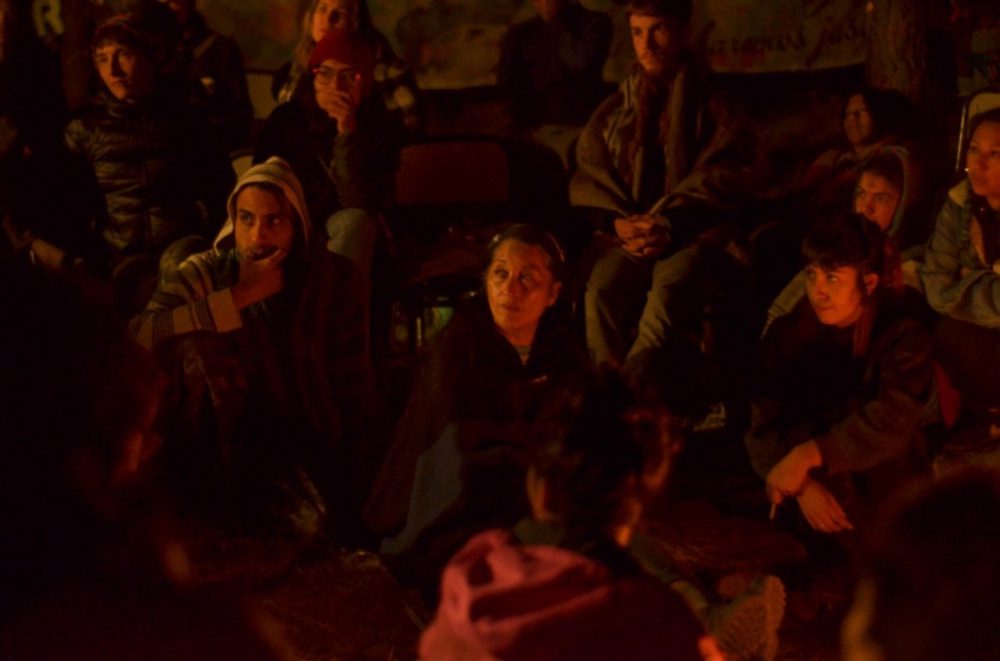
This homogenizing, absurd and oppressive measure will not sustain itself much longer. The reality of mega metropolis has nothing to do with indigenous territories. There is a pressing need for complete consultation and participation in order to mitigate the effects of this quarantine, by establishing communal councils with territorial participation in order to achieve the wellbeing of peoples.
It’s clear that a quarantine is needed, but this is not the right model. If the nation/states oppose this we shall begin to build our own model anyway, because wisdom does not dwell with rotating officers or capitalist corporatocracy – racist and patriarchal – but with the Mapu, Pacha, Earth.
In the end we are all the peoples of the world, all the beings of the planet, and the forces inhabiting in it have only one identity: earthlings. This is why the terricide must end and we must let go of fear and trust that we are not alone in this task: the Earth is our main ally.
These days, as I walk on my mapu, I encountered among the pinewoods a superb, proud poplar. I watched as it spread its yellow leaves on the ground, and how its nakedness unveiled its true structure, its multi-formed branches… some short, others long, some as harmonious and tall as to touch the sky, and others wide and strong falling almost to the ground. Its thick foliage wasn’t letting me see its true essence, the making of the wood that shapes it… only autumn comes to confront its truth.
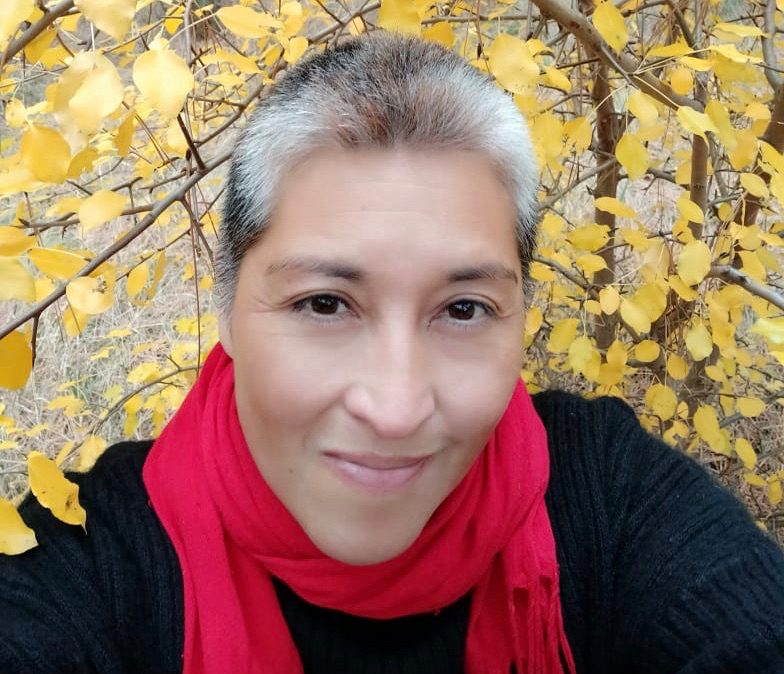
Our autumn has arrived, and I wish to know what kind of wood we are made of, without ornaments or distractions, with no fake colours, stripped of any vanity. I feel the firmness of my roots, and the millenary sap that nourishes me. The end of wingkalandia (colonialism) is approaching. Peoples of the world, let us unite against terricide; and above all, indigenous peoples and nationalities, let us raise up our territorial self-governments.
Isn’t it true that the words of the current president, as well as those of the previous ones, have affirmed they govern for all Argentinians? Neither the present president nor the others before him have said that they rule over the plurinationality inhabiting this country. Perhaps this is the true revolution: self-government for the wellbeing of the peoples, building the Earth without ill.
Finally, a word I learned years ago from my ancestral mapudungun: “yerpun,” to traverse through the night. The bright morning will come when we overcome the most lethal pandemics inoculated on us centuries ago: the pandemic of fear.
Without fear we shall truly heal ourselves.
From puelwillimapu, Moira Millán, Mapuche weychafe (warrior).
Moira Millán is an award-winning Mapuche author, screenwriter and activist from Argentina. She is a weychafe (guardian, defender, warrior) in the Mapuche tradition, a leader in the movement to recover her people’s ancestral lands and a founder of the Movement of Indigenous Women for “Buen Vivir,” which advocates a way of life in harmony with nature.
Many thanks to the One Foundation for the generous sponsorship of this piece, which will enable Moira and her community to prepare for the rapidly approaching winter.
- Reflections from Mapuche Territory - June 4, 2020
- Native Flower Rebellion in Argentina - October 18, 2019
- Mapuche Motherhood in the Age of Benetton - March 7, 2019
I recently dreamed my Ancestors. Alot of signs have been leaping to Life since. I am descended from Wise Folk on both sides. I have been prepared for this Reawakening of Women all my Life as was pointed out by my Ancestors. I may not share blood, language, or anything with you. But a Thread connects us. Mama Earth lives in us and that makes us Family. I feel Her heartbeat in my Womb. I see her beauty in my daughter’s eyes during Ritual. I catch glimpses of her in my Twin Grandbabies smiles. Know that I will ask for your highest good in my Morning Ritual, every day. Thank you. Thank you for being a Light. Thank you for being everything you are. We stand beside you.